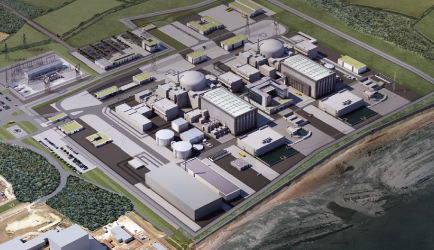Part 2 of 2 Parts (Please read Part 1 first)
Areva is the French state owned company that will construct the new Hinkley Point C reactors. It has not sold a new reactor since 2008 and the delays and problems at the other EPR sites have pushed it into deep debt. Areva cannot come up with its proposed share of the financing for the project. The French government has arranged for EDF to take over Areva and says that Areva's financial problems will not affect the Hinkley Point C project.
Austria is strongly opposed to nuclear power. As a member of the European Union, it has filed a law suit against the European Commission ruling that the Hinkley Point C deal is legal. Austria claims that the guaranteed strike price amounts to a state subsidy for the project which would be prohibited by European Union rules. The case is expected to take several years to move through the legal process but the U.K government and EDF appear to be assuming that the Austria challenge will fail and they are continuing to move forward on the deal.
Environmentalists have attacked the Hinkley Point C project but have been stymied by new laws passed by the U.K. Labour government. The new laws restrict environmental opposition to big infrastructure projects to a few local issues like noise and traffic. The question of whether or not the U.K. needed the new reactors was removed from environmental considerations and given to the government to decide. All of the licenses and permits for the project passed environmental review in less than a year.
In order to provide investment capital for the Hinkley Point C deal, the Chinese are demanding that the U.K. allow them to construct a Chinese design reactor in Somerset. If this is part of the final deal, there will be major questions about the degree to which the U.K. rules and regulations with respect to reactor construction and operation will have to be followed by the Chinese. And, there will be questions about liability in case of a nuclear accident.
With respect to jobs, labor unions in Britain are not impressed. They point out that these are construction jobs which will go away once the reactors have been built. There is also the problem that the reactor project which the Chinese are demanding would be built by Chinese workers and operated by Chinese technicians. U.K. labor would have no role and no jobs would be generated for U.K. workers. This also raises questions about the treatment and safety of the Chinese workers with respect to U.K. labor practices.
As I have said repeatedly, nuclear power would not even be considered if it were not for the fact that the projects and prices are so big that there is plenty of room for tidy profits and bribes all along the supply chain. With the cost of renewables like wind and solar dropping steadily and at least six companies working on nuclear fusion designs which they claim could come on line in ten years, it is almost certain that the guaranteed strike price for Hinkley Point C power in 2026 will be far above the market price. I agree with the critics of the Hinkley Point C project who say that if this project is built, it will be viewed as a huge mistake. I predict that if the deal is signed, eventually the project will be abandoned before completion but after billions of dollars have been wasted.
Artist's concept of Hinkley Point C:
